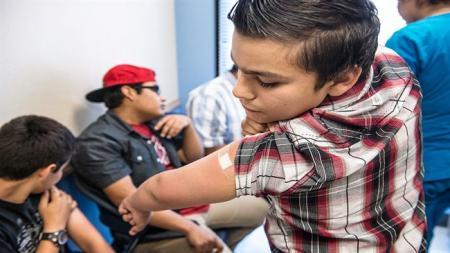
But this first national study of parents' attitudes found that those attitudes shifted if the requirement allowed parents an opportunity to opt out, according to scpr.org.
"It's interesting; if you had opt-out provisions, it tripled their support, but we know from previous research that if you add the opt-out provisions, you will make the law less effective," said the study's lead author, William Calo, a postdoctoral research associate at the University of North Carolina, Chapel Hill.
Such is the conundrum faced by public health officials and policymakers in attempting to improve the coverage of a vaccine that could save an estimated 30,000 lives a year, according to Calo.
The HPV vaccine, recommended by the Centers for Disease Control and Prevention for boys and girls ages 11 and 12, boasts one of the strongest safety records of any vaccine and is highly effective in preventing the infection that causes nearly all cervical cancer, 95 percent of anal cancer, 70 percent of throat and neck cancers and substantial proportions of vaginal, vulvar and penile cancers.
Yet despite the clear medical consensus supporting the CDC recommendation, hesitancy among parents and even providers has hindered its uptake over the past decade.
"Now we have the chance to prevent cancer. This is a disease people care a lot about," said Anna Giuliano, director of the Center for Infection Research in Cancer at Moffitt Cancer Center in Tampa, and a researcher who led some of the HPV vaccine clinical trials. "We have a simple intervention to prevent cancer, but the message has gotten diluted and contorted by the general public that we don't need prevention interventions, whether it's to prevent measles or pertussis or HPV, so this is the struggle."
Every state requires public school children to be up to date with some, if not most, of the vaccinations recommended by the CDC. But only two states, Rhode Island and Virginia, and the District of Columbia require students to receive the HPV vaccine.
In an online survey, his team asked 1,501 parents of 11- to 17-year-old children whether they agreed that laws requiring HPV vaccination for sixth-grade school entry were "a good idea." The parents came from all 50 states and represented a range of incomes and educational levels, though most were mothers and 70 percent of them were white. Their children were an average age of 14, and 46 percent of them had received at least one dose of the HPV vaccine.
